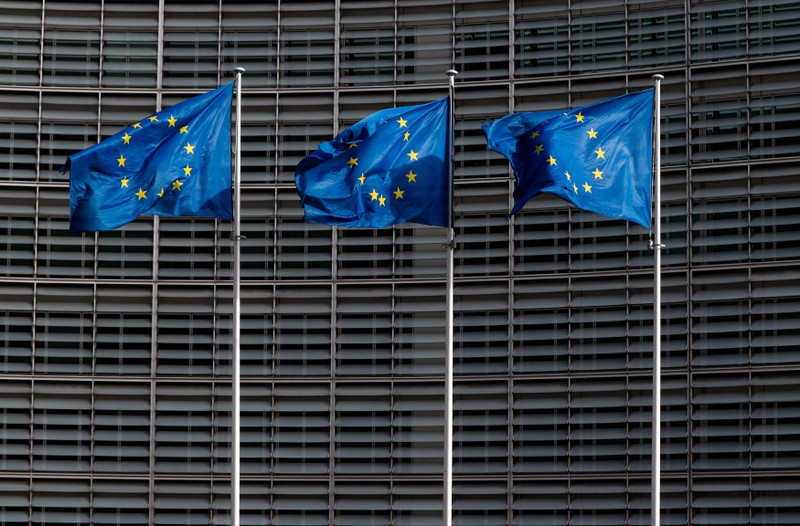Reuters API
Mar 13, 2018
Europe, U.S. senator push back as Trump seeks lower EU tariffs
Reuters API
Mar 13, 2018
U.S. Commerce Secretary Wilbur Ross will urge the European Union to lower its trade barriers, U.S. President Donald Trump said on Monday, calling them unfair to U.S. farmers and industry, a view rejected by the EU and challenged by a Republican senator.
The European Commission accused Trump of "cherry-picking" data to distort the debate in a transatlantic dispute over U.S. metals tariffs that threatens to become a trade war.

The EU is seeking to be exempted from planned U.S. import duties of 25 percent on steel and 10 percent on aluminium, but says Washington has not made clear how the exemption process works.
Trump said in a tweet on Saturday the United States was ready to drop its tariffs if the EU lowered its "horrific" rates on U.S. products. On Monday, he tweeted that Ross would be speaking with EU representatives about eliminating "large tariffs and barriers".
"Not fair to our farmers and manufacturers," he wrote.
White House Deputy Press Secretary Lindsay Walters said Ross will work closely with U.S. Trade Representative Robert Lighthizer on determining country exemptions from the steel tariffs, specifically "whether proposed measures between the United States and another country will address the national security threat posed by that country’s export to the United States of steel or aluminium products."
Ross also has primary responsibility for overseeing a process under which companies can petition to exclude specific steel and aluminium products from the tariffs. A Trump administration official said these procedures are awaiting final clearance and are expected to be published within a week.
PROTEST BILL IN U.S. SENATE
Jeff Flake, a Republican senator from Arizona and vocal Trump critic, on Monday introduced a bill in Congress to nullify the tariffs, though it would be extremely difficult for the measure to achieve a two-thirds majority needed to override an expected Trump veto.
Flake warned on the Senate floor that the tariffs risk a reversal of recent economic gains, adding: "We in Congress simply cannot be complicit as this administration courts economic disaster in this fashion."
French Finance Minister Bruno Le Maire said he was worried about the possibility of a U.S.-EU trade war, but said Europe had to respond to new U.S. tariffs on Europe. Failure to do so "would give the impression to the European people that we are weak," Le Maire told reporters European metals industry conference.
The Commission said it expected to be in contact with Washington over the metals tariffs this week, but that no formal talks had been scheduled.
Meanwhile, Canadian Foreign Minister Chrystia Freeland is due to visit Washington this week from Tuesday to meet with Ross, Lighthizer and U.S. lawmakers to senators to "advance Canada’s efforts to keep trade open, fair and barrier-free, to benefit people on both sides of the border," the ministry said in a statement.
Trump has granted Canada and Mexico a temporary reprieve from the steel and aluminium tariffs, but has linked permanent exemptions to progress in negotiations to update the North American Free Trade Agreement.
Trump spoke to Canadian Prime Minister Justin Trudeau on Monday about the metals tariffs, the White House said in a statement.
Trump also emphasized the importance of quickly concluding negotiations on the North American Free Trade Agreement (NAFTA) "to ensure the vitality of United States and North American manufacturing industries and to protect the economic and national security of the United States," the statement said.
A European Commission spokesman said Trump was "cherry-picking" particular tariffs to highlight differences, and maintained that average tariffs were very similar on each side of the Atlantic at about 3.0 percent for products into Europe and 2.4 percent into the United States.
The U.S. tariff for cars, at 2.5 percent, was lower than the EU rate of 10 percent, but its rate of up to 25 percent on trucks was higher. The Commission spokesman also pointed to U.S. import duties of up to 48 percent on shoes, 12 percent on textiles and 164 percent on peanuts.
The EU has been talking with partners about a legal challenge at the World Trade Organization to Trump's plan and is considering safeguards to prevent steel and aluminium, diverted from the United States, flooding into Europe.
It has also lined up 2.8 billion euros (£2.4 billion) of U.S. products, from bourbon to motorcycles, on which to impose tariffs so as to "rebalance" trade flows.
© Thomson Reuters 2024 All rights reserved.




























